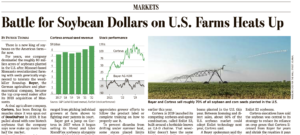A new 10% tariff on goods from around the world took effect Tuesday — with a list of exemptions including beef. Other exemptions affecting the food and agriculture industries include…
Ukraine Set to Bring Unilateral Grain Bans to WTO; While WSJ Explores U.S. Soy Seed Market
Reuters writer Tom Balmforth and Pavel Polityuk reported today that, “Ukraine plans to sue Poland, Hungary and Slovakia over bans on Ukrainian agricultural products, Agriculture Minister Mykola Solsky said on Monday.
“‘I think (it will be) in the near future,’ he told Reuters.”
The Reuters article pointed out that, “Restrictions imposed by the European Union in May allowed Poland, Bulgaria, Hungary, Romania and Slovakia to ban domestic sales of Ukrainian wheat, maize, rapeseed and sunflower seeds, while permitting transit of such cargoes for export elsewhere.
“Poland, Slovakia and Hungary announced their own restrictions on Ukrainian grain imports on Friday after the executive European Commission decided not to extend its ban on imports into Ukraine’s five EU neighbours.”
Balmforth and Polityuk added that, “The EU allowed its ban to expire on Friday after Ukraine said it would take measures to tighten control of exports to neighbouring countries.”
Also today, Bloomberg writers Volodymyr Verbyany and Kateryna Choursina reported that, “Ukraine will move to challenge unilateral grain-import bans imposed by three of its European Union neighbors and weigh retaliatory measures as the dispute between war-time allies escalates.
The government in Kyiv will file a complaint to the World Trade Organization on Monday over measures taken by Poland, Slovakia and Hungary, Deputy Economy Minister Taras Kachka told Bloomberg.
Verbyany and Choursina noted that, “The three Ukrainian neighbors, some of which have been staunch supporters of the war-battered nation, defied the EU’s decision Friday to end a ban on grain purchases, citing the impact on plummeting prices for their markets.”
And Alice Hancock reported today at The Financial Times Online that, “Spain’s agriculture minister has said that unilateral bans applied to imports of Ukrainian grain by Hungary, Slovakia and Poland over the weekend are ‘incompatible’ with EU unity and could be illegal.”
The FT article indicated that, “‘Taking unilateral action banning access to the single market seems to me out of the law but is for the commission to judge,’ said Luis Planas, ahead of chairing a meeting of agriculture ministers on Monday.”
Yesterday, Reuters writer Jan Strupczewski reported that, “The European Commission called on Poland, Hungary and Slovakia on Sunday to be constructive after they unilaterally declared they would continue to ban grain imports from Ukraine despite the Commission’s decision to end the ban.
“‘We are aware of some Member States’ announcements in respect to unilateral measures. What is important right now is that all countries work in the spirit of compromise and engage constructively,’ a Commission spokeswoman said.”
Meanwhile, Reuters wrier Pavel Polityuk reported today that, “Analyst APK-Inform has increased the export forecast for Ukraine for the new 2023/24 season to 19 million metric tons from the previous outlook of 18 million.
“The consultancy said on Monday that Ukraine, a global major corn grower and exporter, could export 27.3 million tons of corn in 2022/23.”
Elsewhere, Bloomberg writer Hallie Gu reported yesterday that,
Grain farmers in northern China have escaped the worst impact of the summer’s typhoons on production, with harvests of crops like corn set to rise in the coming year
“The torrential rains that lashed northern regions left dozens dead and fields flooded, raising fears that some agricultural production could be devastated. But broadly favorable weather over the growing season and increases in acreage are likely to more than offset the hit to yields caused by the deluge.”
And Patrick Thomas reported in today’s Wall Street Journal that, “There is a new king of soybeans on the American farm—for now.
“For years, one company dominated the roughly 80 million acres of soybeans planted in the U.S. after Missouri-based Monsanto revolutionized farming with seeds genetically engineered to tolerate the weedkiller Roundup. Bayer, the German agriculture and pharmaceutical company, became the top crop-seed maker after its 2018 acquisition of Monsanto.
“A rival agriculture company, Corteva, has been flexing its muscles since it was spun out of DowDuPont in 2019. It has pulled ahead with new biotech soybeans that the company says now make up more than half the market.”

Thomas noted that, “Together, Bayer and Corteva sell roughly 70% of all corn and soybean seeds planted in the U.S., up from about 40% two decades ago, according to the U.S. Department of Agriculture.
“The companies are in hot competition for the billions of dollars that farmers spend each year on seed-and-chemical combinations designed to combat hard-to-kill weeds. Bayer and Corteva also make hundreds of millions of dollars licensing to other seed suppliers the genetic technology that enables crops to resist specific weedkillers.”





